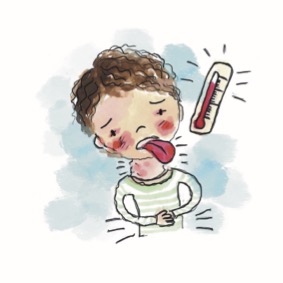PIMS
PIMS, PIMS-TS (Paediatric Inflammatory Multisystem Syndrom Temporally associated with SARS-CoV-2) or MIS-C (Multisystem Inflammatory Syndrom in Children) are abbreviations denoting the same disease. It is a rare but very serious multisystem inflammation caused by an abnormal immune response affecting multiple organs at the same time. PIMS is typical in children who have had COVID-19 infection in the past. Early diagnosis and therapy is most important for the recovery of patients, so there is a need to raise awareness of this relatively new syndrome, the symptoms of which are initially non-specific. The algorithm will guide you through the typical symptoms and specific treatment of a PIMS sufferer.
Review
Paediatric Inflammatory Multisystem Syndrome Temporally Associated with COVID
-19 / Multisystem Inflammatory Syndrome in Children (PIMS TS / MIS-C) is syndrome
characterised by fever, inflammation and various stage of multiorgan dysfunction. This
syndrome was described for the first time in April 2020, in relation to pandemic SARS
CoV-2, and belongs to spectrum of complications following this infection:
• Asymptomatic or mild illness (majority of children, PCR +)
• Severe acute COVID-19 (adolescents, comorbidities, obesity, PCR +)
• Acute COVID-19 respiratory illness with inflammation (PCR +, antibody+)
• PIMS TS/MIS-C fever and inflammation (antibody+)
• Kawasaki-Like PIMS TS/MIS-C (antibody+)
• PIMS TS/MIS-C shock, myocarditis, multiorgan failure (antibody+)
Clinical presentation includes fever, rash, conjunctivitis, abdominal pain, diarrhoea/
vomiting, headache and encephalopathy (around 20% of children especially with severe
form). Approximately 30 - 40% of children suffer from serious form of illness and
demonstrate symptoms of shock, hypotension, myocardial dysfunction, ECG changes (atrial
arrhythmias typically); dilatation of coronary arteries occurs in 10 - 20% of children. Severe
form includes bowel inflammation. Typical laboratory picture demonstrates lymphopenia,
thrombocytopenia, very high CRP, coagulopathy, high fibrinogen and D-Dimers; elevated
cardiac enzymes are present in later stages of illness or in cardiac involvement. SARS CoV-2
PCR is often negative, SARS CoV-2 IgG are positive in most as the syndrome manifests
typically 4 to 6 weeks after acute SARS CoV-2 infection. Diagnosis of this syndrome outside
of pandemic can be difficult due to diverse presentation and overlap with many conditions;
taking into consideration acute abdomen, appendicitis, sepsis/septic shock, TSS, myocarditis,
oncological illness, MAS secondary to JIA, recent travel history/refugees: malaria, dengue
fever, chronic typhoid.
The management is mainly supportive - fluids, inotropes/vasopressors, oxygen, broad
spectrum antibiotics (+/- clindamycin) due to inability to rule out bacterial infection at this
stage. Anticoagulation or aspirin is indicated in very inflamed patients with cardiac
dysfunction or coronary artery dilatation. The role of immunomodulation is being studied
from the point of indication, timing and combination. Currently, the first choice of treatment
are immunoglobulins and steroids; in situation of resistant inflammation biological treatment
is considered (anakinra, tocilizumab, infliximab). It is important that high quality supportive
care is related to low mortality of the syndrome (around 0.1%, from the UK reports).
The incidence of PIMS TS/MIS-C is declining. That could be explained by viral
mutations and changes in spike protein, or by protective effect of postinfectious or
postvaccination immunity. The presented algorithm reflects pitfalls of diagnostics and
treatment of PIMS TS/MIS-C. The main emphasis lays on differentials and key aspects of
safe management of this novel syndrome.
Sources
VUJCIKOVA, Julia. Paediatric Inflammatory Multisystem Syndrome – Temporally associated with SARS-CoV-2 pandemic (PIMS-TS). Library.leicestershospitals.nhs.uk [online]. United Kingdom, 2021 [cit. 2022-04-05]. Dostupné z: http://www.library.leicestershospitals.nhs.uk/PAGL/Shared%20Documents/Paediatric%20Inflammatory%20Multisystem%20Syndrome%20–%20Temporally%20Associated%20with%20SARS-CoV-2%20(PIMS-TS)%20UHL%20Childrens%20Guideline.pdf
DAVID, Jan, Michaela ŠIBÍKOVÁ, Jakub JONÁŠ, Veronika STARÁ, Hana MALCOVÁ a Filip FENCL. Severe complication of COVID-19 in children: Paediatric inflammatory multisystem syndrome. Pediatrie pro praxi [online]. 2021, 22(1), 8-11 [cit. 2022-05-28]. ISSN 12130494. Available from: https://www.solen.cz/artkey/ped-202101-0001_zavazna_komplikace_covid-19_u_deti_syndrom_multisystemove_zanetlive_odpovedi.php





